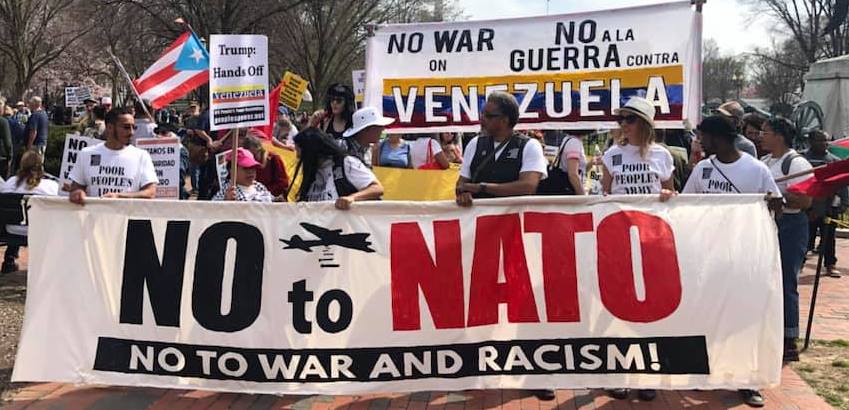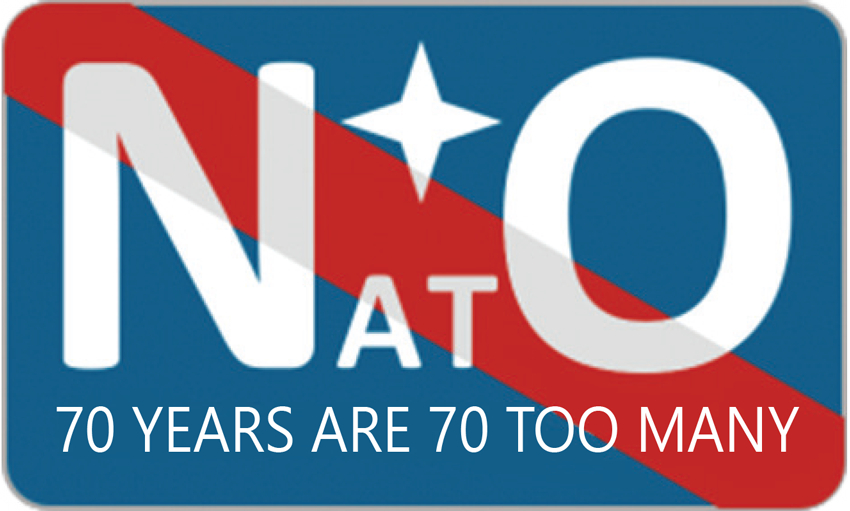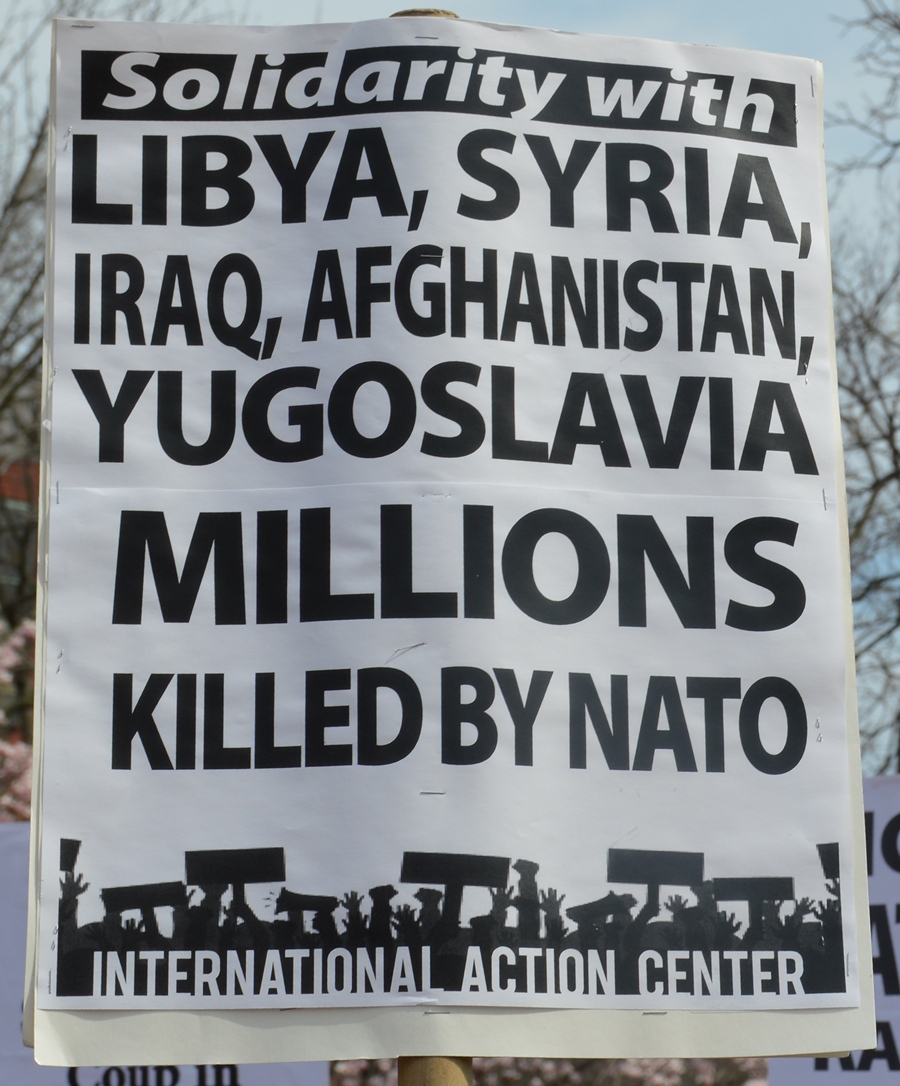|
Muted NATO Summit on 70th Anniversary of NATO's Founding

Washington, DC protest March 30, 2019, begins week of actions.
On April 3-4, foreign ministers from the North Atlantic Treaty Organization (NATO) met in Washington, DC to mark the 70th anniversary of NATO's founding, April 4, 1949. The summit was hosted by the U.S. State Department and attended by U.S.
Secretary of State Michael Pompeo. Trump did not attend, though he met with NATO Secretary General Jens Stoltenberg at the White House on April 2. The summit is being described as "uneventful," in part because the serious divisions that exist continue to deepen and were not resolved despite NATO being presented as the most successful alliance in history. Despite the divisions, a show of unity was in part directed at Russia and China, as a means to show that NATO is still in a position to act. "No military alliance in the world can remotely do what we do. No alliance can remotely match the power of the nations represented here today," Pompeo said.
Pompeo's remarks were also specifically intended to reassure NATO members of the U.S. commitment to collective defence. He needed to do that in view of the fact that Trump has said more than once that the U.S. might not uphold Article 5, which requires NATO countries to defend any one member if attacked. Pompeo said that NATO has been "made strong through our collective defence commitment as enshrined in Article 5, to which we all recommit today." The U.S. Ambassador to NATO repeated this as well, saying: "The United States has consistently affirmed its support for NATO, including the principle of collective defence enshrined in Article 5... the President, Vice President, Secretaries of State and Defense, and other senior U.S. officials have all underscored this."
While this is what was said, Trump and Pompeo still made a
point of targeting Germany especially to increase its war
funding. In this manner, it can be seen that the "German
Question," as it was referred to in 1949, remains.
The "German Question" Remains
 When NATO was founded in 1949, it was a period of upsurge among the peoples, who had defeated fascism. They were demanding the denazification of Germany, the dismantling of its war industry and restoration of democratic liberties as well as fighting for and forming people's democracies. NATO was formed in part to block this democratic surge and to restore Nazis to positions of power, with the U.S. playing the main role. While the peoples were striving to consolidate their victories over fascism and eliminate any remnants of the Nazis and Nazi power from their midst, the U.S. was acting to do the opposite. This included the division and occupation of Germany and formation of NATO. Lord Hastings Lionel Ismay, NATO's first Secretary General spoke to this, saying the goal for NATO was to "Keep the Soviet Union out, the Americans in, and the Germans down." When NATO was founded in 1949, it was a period of upsurge among the peoples, who had defeated fascism. They were demanding the denazification of Germany, the dismantling of its war industry and restoration of democratic liberties as well as fighting for and forming people's democracies. NATO was formed in part to block this democratic surge and to restore Nazis to positions of power, with the U.S. playing the main role. While the peoples were striving to consolidate their victories over fascism and eliminate any remnants of the Nazis and Nazi power from their midst, the U.S. was acting to do the opposite. This included the division and occupation of Germany and formation of NATO. Lord Hastings Lionel Ismay, NATO's first Secretary General spoke to this, saying the goal for NATO was to "Keep the Soviet Union out, the Americans in, and the Germans down."
Today the U.S. has 32,000 troops and dozens of bases in Germany. It is pushing for Germany to greatly increase funding for war, including weapons and forces. The Pentagon, for example, is demanding NATO members meet what it refers to as "4-30" -- 30 battalions, 30 aircraft squadrons, 30 ships ready to move in 30 days.
In his speech Pompeo
referenced Germany without naming it,
saying, "Now is not the time to repeat tired excuses that our citizens don't support increased defence spending or security spending. Each nation has a duty to make the case to our people. We, as leaders, have a duty to make the case to our citizens about why this work, why these resources are important to keep not only our own countries but our alliance strong."
President Trump was more direct in comments April 2: "Germany, honestly, is not paying their fair share... They're paying close to 1 per cent, and they're supposed to be paying 2 per cent. And the United States, over the years, got to a point where it's paying 4.3 per cent, which is very unfair...because it's 4.3 of a much larger GDP. So we're paying for a big
proportion of NATO, which basically is protecting Europe." Vice President Pence repeated the demand April 3 saying,
"Germany must do more." Referring to the Nord Stream offshore natural gas pipeline from Vyborg in the Russian Federation to Greifswald in Germany Pence said: "And we cannot ensure the defence of the West if our allies grow dependent on Russia." "It
is simply unacceptable for Europe's largest economy to continue to ignore the threat of Russian aggression and neglect its own self-defence and our common defence," Pence added.
Clearly the U.S. wants to block Germany from allying with Russia, while also having it do more to act militarily to protect Europe. Meanwhile, Trump has indicated repeatedly that the U.S. is reserving for itself a potential alliance with Russia. He regularly says he wants friendly relations with Russia so when he repeatedly threatens to withdraw the U.S. from NATO, it indicates such an alliance is a factor for withdrawal. When he threatens to withdraw the U.S. from NATO which he also does repeatedly, this is one of the reasons he gives. As well, with its 32,000 troops and dozens of bases on German soil, the U.S. does not appear worried about Germany becoming a stronger military power. The rest of the Europeans, however, are worried. For them the problem of "keeping the Germans down," remains. As is the case in the U.S., there is also broad opposition among the people, not only in Germany but throughout Europe to stepped up militarization, increased war funding and aggressive U.S.-led NATO wars. Not only did the summit do nothing to resolve "the German
Question," but Trump, Pence and Pompeo repeated in tandem that it is "unacceptable," for Germany not to increase war funding and that the U.S. may not continue to protect Europe. This does nothing to assuage European concerns about the rise of Germany militarily and the possible refusal of the U.S. to uphold Article 5 and even withdraw from NATO. Whatever form NATO may take in the future, U.S. dictate and conflicts within NATO, within the NATO countries themselves including the U.S. and between the U.S. and Europe will remain. NATO's expansion since the end of the Cold War has done nothing as concerns keeping Germany down or
resolving these conflicts. The inter-imperialist striving for domination has only exacerbated the contradictions and increased the danger of war in Europe causing the peoples increasing concern.
Force for Wars of Destruction
 At the Summit, Pompeo presented NATO as a major force for peace. NATO has provided a "shield against aggression and acts as a deterrent," he said. Creating NATO has paid "a massive dividend: decades of peace and prosperity for the West on a scale unrivaled in world history," he said. Everyone is to forget the massive U.S.-led NATO war to destroy Yugoslavia by completely dismembering the country. Evidently we are to forget the U.S.-led NATO aggression against Afghanistan, Libya, Syria, and interference in Africa and now Latin America as Colombia has become a "global partner" of NATO, possibly to be followed by Brazil. The "deterrence" provided is to deter the striving of the peoples against war and for their rights. The upsurge after WWII to secure democracies that favour the people remains incomplete. NATO is precisely a deterrent to the completion of these democratic revolutions in Europe as well as the U.S. and Canada. At the Summit, Pompeo presented NATO as a major force for peace. NATO has provided a "shield against aggression and acts as a deterrent," he said. Creating NATO has paid "a massive dividend: decades of peace and prosperity for the West on a scale unrivaled in world history," he said. Everyone is to forget the massive U.S.-led NATO war to destroy Yugoslavia by completely dismembering the country. Evidently we are to forget the U.S.-led NATO aggression against Afghanistan, Libya, Syria, and interference in Africa and now Latin America as Colombia has become a "global partner" of NATO, possibly to be followed by Brazil. The "deterrence" provided is to deter the striving of the peoples against war and for their rights. The upsurge after WWII to secure democracies that favour the people remains incomplete. NATO is precisely a deterrent to the completion of these democratic revolutions in Europe as well as the U.S. and Canada.
Pompeo Raises Spectre of Communism Pompeo used the occasion of the NATO Summit to once again
resurrect the Cold War rhetoric about the threat of communism. He used Germany to do so. He said, "There's a second anniversary of significance to the West that we celebrate this year too: the crumbling of the Iron Curtain... That anniversary is intimately connected to NATO. For 40 years, the NATO alliance was a bulwark against communist expansion in Europe. We were ready to invoke Article 5 at any moment if the Soviets poured through the Fulda Gap, the way that we did after 9/11. Our military superiority deterred them from acting on their designs of dominating Europe, and in the meantime, President Reagan's military buildup drove the evil empire into bankruptcy."
The Cold War has long since ended. The promised "peace dividend" proclaimed by Pompeo never materialized. The
destruction of Yugoslavia, ongoing U.S.-led NATO wars and massive Pentagon budgets and demands for increased military funding by NATO reveal the truth of the matter. What then is the purpose in raising this spectre of communism today? It is to target the striving of the people for their rights, for societies that favour the interests of the people and their drive for an end to war and for relations of mutual respect and benefit among the peoples, as was the case 70 years ago when NATO was founded in the first place. It is to say once again that there is no alternative to imperialism, to U.S. domination, and to military and political blocs against the people such as NATO. It is to claim that history can go no further than this. The peoples must simply submit to the U.S. and its dysfunctional and outmoded democracy. The peoples say NO! as the actions show which were held against NATO in Washington in D.C. and elsewhere in the world at the time of the Summit and on this NATO anniversary. The peoples are fighting together for modern democracies that empower the people and block the warmongers.
 Pompeo also called for NATO to extend its reach. "We
must
adapt our alliance to confront emerging threats too, whether that's Russian aggression, uncontrolled migration, cyber attacks, threats to energy security, Chinese strategic competition -- including technology in 5G -- and many other issues that
jeopardize our people's ideals and our collective security," he said. To raise "uncontrolled migration" as a threat at a time Trump is threatening to close the border with Mexico and has positioned thousands of troops on the border and the crisis caused by U.S.-led wars in West Asia, is a deliberate offence. He mentions China and 5G at a time when Canada and the U.S. are already criminalizing the Chinese company Huawei, claiming its 5G network is a threat to national security. Similarly, the U.S. is targeting NATO member Turkey for purchasing a Russian missile defence system. "Turkey must choose," Vice President Pence
warned. "Does it want to remain a critical partner in the most successful military alliance in history, or does it want to risk the security of that partnership by making such reckless
decisions that undermine our alliance?" Pence thundered. The U.S. is not only demanding that NATO countries increase their funding but the standardization of weapons and equipment as produced by the U.S. war industry, not any other. The rivalry is not only with China and Russia, but with the European Union as well. Pompeo also called for NATO to extend its reach. "We
must
adapt our alliance to confront emerging threats too, whether that's Russian aggression, uncontrolled migration, cyber attacks, threats to energy security, Chinese strategic competition -- including technology in 5G -- and many other issues that
jeopardize our people's ideals and our collective security," he said. To raise "uncontrolled migration" as a threat at a time Trump is threatening to close the border with Mexico and has positioned thousands of troops on the border and the crisis caused by U.S.-led wars in West Asia, is a deliberate offence. He mentions China and 5G at a time when Canada and the U.S. are already criminalizing the Chinese company Huawei, claiming its 5G network is a threat to national security. Similarly, the U.S. is targeting NATO member Turkey for purchasing a Russian missile defence system. "Turkey must choose," Vice President Pence
warned. "Does it want to remain a critical partner in the most successful military alliance in history, or does it want to risk the security of that partnership by making such reckless
decisions that undermine our alliance?" Pence thundered. The U.S. is not only demanding that NATO countries increase their funding but the standardization of weapons and equipment as produced by the U.S. war industry, not any other. The rivalry is not only with China and Russia, but with the European Union as well. The U.S. thinks that its self-serving portrayal of NATO will
prevail. "Our structure is designed to empower each ally, not to subjugate it. We maintain an outstanding degree of unity," Pompeo said. The reality is that just as NATO was brought into being as an instrument of the U.S. striving to control Europe so as to dominate Asia, it could just as well pass away as others also strive to control Europe and dominate Asia, including the Asians themselves. Most importantly, the peoples of the world continue to hoist the banner of peace, freedom and democracy in a manner which is consistent with the actual conditions today which defy attempts by the imperialist powers with the U.S. in the lead to control the situation. NATO's anniversary summit was a muted affair that did nothing to resolve any of the conflicts within NATO and, especially, did nothing to "keep Russia out, Germany down and the U.S. in."
The peoples' cause for peace and security is best served by getting out of NATO and dismantling NATO. That is what 70 years of NATO reveal.
(TML Weekly, April 6, 2019 - No. 12)
Return to Index on Ukraine
(To access articles individually click on
the black headline.)
Website: www.cpcml.ca
Email: editor@cpcml.ca
|